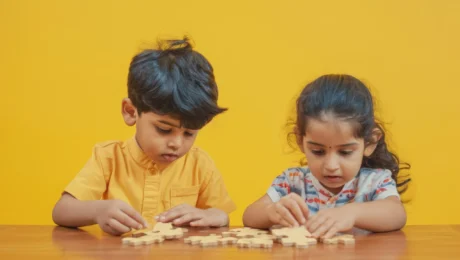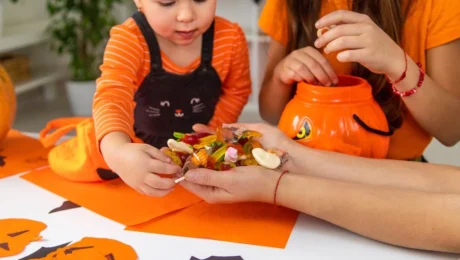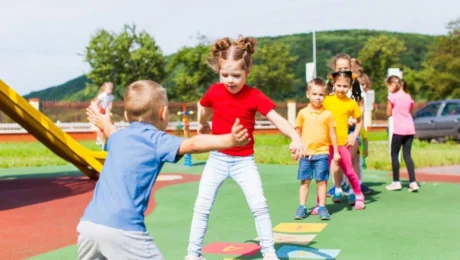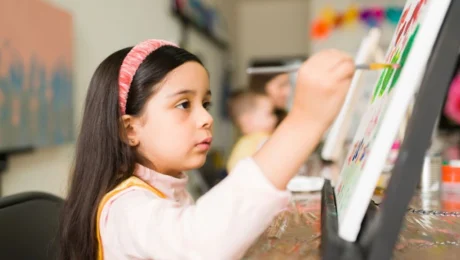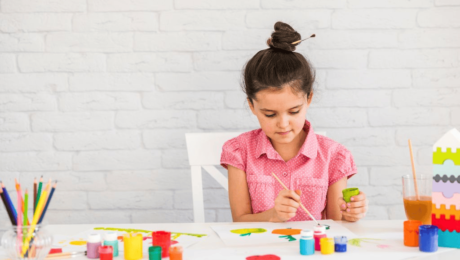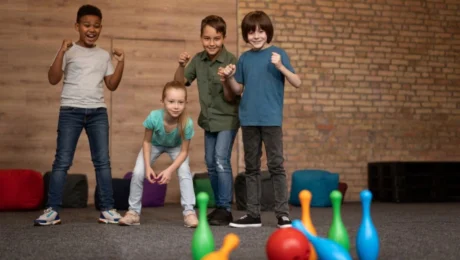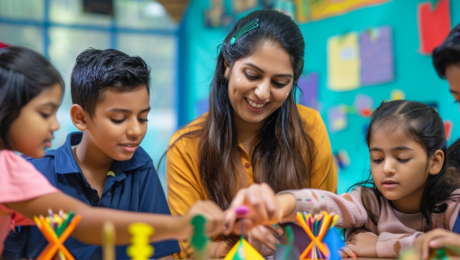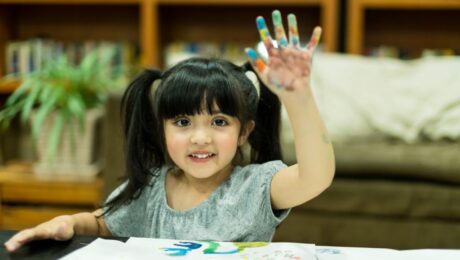Active Indoor Games for Preschoolers: What Actually Works When Kids Are Stuck Indoors
Anyone who has spent time with preschoolers knows one thing very clearly. They don’t stop moving just because they’re indoors. If anything, they move more. Chairs turn into obstacles, floor mats become jumping spots, and silence disappears very quickly. This is where active indoor games for preschoolers stop being a “nice idea” and start becoming necessary.
Indoor movement is not about tiring children out. It’s about giving their energy somewhere sensible to go. When that doesn’t happen, attention drops, frustration builds, and even simple tasks feel harder than they should. Thoughtfully planned active indoor games for preschoolers help prevent that spiral before it starts.
Why Preschoolers Need Movement Even Indoors
Preschool children are still learning how their bodies work. Balance, coordination, and control don’t develop by sitting quietly. They develop through repeated movement. This is why active indoor games for preschoolers support learning in ways worksheets never will.
Children who move regularly indoors tend to:
- Settle faster after play
- Listen longer during group time
- Handle transitions more calmly
These are not dramatic changes, but they add up over the day. This is one reason many early educators rely heavily on active indoor games for preschoolers during long indoor stretches.
Indoor Play Is Not Just Random Running
There is a big difference between chaos and purposeful movement. Active indoor games for preschoolers work best when they have just enough structure.
That structure might look like:
- A clear start and stop
- One simple rule
- A defined space
Children don’t need complicated instructions. They need predictability. This same approach carries into indoor games for kindergarten, where children are expected to manage slightly longer activities with similar boundaries.
What These Games Look Like in Real Classrooms
Most active indoor games for preschoolers are built from very ordinary things. Tape on the floor. Chairs pushed aside. A soft ball. Music that starts and stops.
You might see children:
- Walking along a taped path
- Crawling under tables
- Rolling a ball back and forth
- Freezing when music stops
None of this looks impressive on paper. But it works. These are the kinds of game ideas for kids that survive because children actually enjoy them.
Movement and Learning Are Connected
Children don’t separate movement from thinking. Adults do. During active indoor games for preschoolers, children are learning constantly, even when no one is “teaching”.
They practice:
- Listening to instructions
- Remembering sequences
- Waiting for turns
- Adjusting speed and space
This is why many teachers schedule active indoor games for preschoolers before quieter activities. Movement prepares the brain for focus.
Emotional Regulation Happens Through Motion
Preschool emotions rise quickly and fall slowly. A small disappointment can turn into tears in seconds. Active indoor games for preschoolers help children release emotional energy before it spills over.
After movement, children are often:
- Less reactive
- More cooperative
- More open to guidance
This effect is subtle but consistent. It’s one of the strongest reasons indoor movement matters.
The Adult’s Role During Indoor Games
During active indoor games for preschoolers, adults are not referees. They are anchors.
They:
- Demonstrate movements instead of explaining too much
- Watch for signs of overload
- Step in calmly when needed
- Let children try again without correction
This approach keeps games inclusive. Children who hesitate are not pushed. Children who rush are gently slowed.
Planning Without Overplanning
One mistake adults often make is adding too many activities. Active indoor games for preschoolers don’t need variety every five minutes.
A good indoor session usually includes:
- One energetic game
- One slower movement
- A calm transition
This rhythm prevents exhaustion and overstimulation. Many effective game ideas for kids fail simply because they are stacked too tightly.
Adapting for Different Children
Not all preschoolers move the same way. Some jump immediately. Some watch first. Some repeat the same movement over and over. Active indoor games for preschoolers need space for all of this.
Teachers often allow:
- Partial participation
- Shorter turns
- Observation before joining
This flexibility is also what makes the transition to indoor games for kindergarten smoother later on.
Social Skills Grow Quietly Here
During active indoor games for preschoolers, children learn how to exist in a group without being told.
They learn:
- How close is too close
- When to wait
- How to follow group cues
These lessons don’t come from explanation. They come from repetition.
Why These Games Stay With Children
Children may not remember rules, but they remember how something felt. Active indoor games for preschoolers often become part of the day that children talk about later.
They remember:
- Laughing
- Succeeding
- Being included
This is why simple, familiar game ideas for kids often matter more than new or creative ones.
Also Read: Craft Activities for Preschoolers: What We See Every Day at Little Scholar
Indoor Games Are Not a Backup Plan
Indoor movement is sometimes treated as second best to outdoor play. It shouldn’t be. Active indoor games for preschoolers develop control, awareness, and listening in ways outdoor play sometimes doesn’t.
Both are needed. One does not replace the other.
Final Thought
Good indoor movement doesn’t try to impress. It tries to support. Active indoor games for preschoolers work best when they feel natural, repeatable, and calm.
They don’t solve everything. But they make the day easier. And in early childhood education, that matters more than most people realise.
- Published in Top Play School
Kindergarten Graduation Day: More Than Caps, Gowns, and Photos
At Little Scholar Noida, graduation isn’t treated as a checklist item at the end of the academic calendar. It’s treated as a moment of pause. A moment where teachers, parents, and children all take a breath and recognise how far a child has quietly come. Graduation day for kindergarten here is not about performances or perfection. It’s about acknowledging growth that happened slowly, naturally, and often without anyone noticing in the moment.
That belief shapes the way the entire day unfolds and, in many ways, reflects what early education should feel like at this age.
What Graduation Really Means in a Kindergarten Classroom
Walk into a classroom at the beginning of the year and the difference is obvious. Some children hesitate at the door. Some won’t let go of their parent’s hand. A few may not even want to step inside at all.
Now fast forward to the end of the year, when graduation day for kindergarten arrives. Those same children walk in more confidently.
1. They know where their bag goes.
2. They know how to sit with the group.
3. They know how to ask for help without fear.
This is what graduation actually reflects. Not an academic finish line, but a child being ready emotionally.
Why This Day Matters So Much to Parents
Most parents don’t only look for worksheets and early academics. What they really want is simple: a place where their child feels safe and cared for, especially in the first years of school.
That’s why graduation day for kindergarten becomes such a big deal. It’s not only a ceremony. It’s proof that a child has settled into learning, built trust, and found comfort in a classroom environment.
For many families, that’s the real achievement.
The Child’s Experience on Graduation Day
Adults experience milestones through photos, speeches, and achievements. Children experience them differently. They experience them through tone, routines, and the people around them.
That’s why graduation day for kindergarten should not feel loud or stressful. Children should not feel pushed into the spotlight. They should not feel like they’re being tested on stage.
When the environment stays calm and familiar, children feel proud rather than pressured. And that small difference changes everything.
How Graduation Is Planned With Care
You can tell a lot about a school’s values by how it handles events.
On graduation day for kindergarten, thoughtful planning matters more than big decorations. Short programs work better. Activities that feel like play work better. Rehearsals should be light and stress free.
Most of all, every child should feel included, even the quiet ones.
What This Day Represents (Even If It Doesn’t Show on Paper)
By graduation time, children have gained skills that don’t always appear on report cards.
They learn how to:
- Follow routines without constant reminders
- Wait their turn and listen
- Share space with others
- Express feelings with words
- Trust adults outside the family
So when graduation day for kindergarten comes around, it becomes a visible marker of invisible growth.
Also read: Difference Between Independence Day and Republic Day: Explaining It The Way Children Understand
Helping Children Move Into the Next Stage
Transitions are often harder for parents than children. Parents worry if their child will cope, adjust, and feel confident in a new environment.
That’s why graduation day for kindergarten can be used as a bridge instead of a sudden ending. When teachers talk to children about “next year” as something exciting, children start to feel curious instead of scared.
It becomes a gentle step forward.
A Window Into the School’s Culture
Parents attending graduation day for kindergarten often notice something simple but powerful: there’s no chaos.
- There is no last minute pushing.
- No loud instructions.
- No pressure to perform perfectly.
Instead, the atmosphere stays calm. And that calm usually reflects the school itself: patient, steady, and child focused.
The Teacher’s Role During the Ceremony
Some schools treat graduation like a stage show. Teachers remain behind the scenes. Children stand alone in front.
But in early years, children still need emotional support. So on graduation day for kindergarten, teachers being present matters. Their smile. Their reassurance. Their closeness.
For a child, that’s safety. And safety is what builds confidence.
How Parents Can Prepare Their Child (Without Overdoing It)
Parents often overprepare because they don’t want their child to freeze or feel nervous.
But preparation should be simple. Before graduation day for kindergarten, parents can:
- Talk about the day in a happy, positive way
- Avoid over-rehearsing at home
- Let the child express excitement or nervousness naturally
- Focus more on comfort than performance
Children usually do best when adults don’t make the day feel “too serious”.
What Parents Should Observe During the Event
During graduation day for kindergarten, parents naturally focus on photos. But the real moments are often the smaller ones.
Notice if:
- Every child is acknowledged
- Teachers stay attentive and warm
- Children are allowed to be children
- The event feels peaceful, not rushed
These details say more than any costume ever could.
Beyond Graduation: What This Day Leaves Behind
The day ends. Families go home. The gown is folded. Photos are saved.
But a child carries something else: confidence.
A child who felt safe during graduation day for kindergarten usually walks into the next stage of school with a stronger mindset. They trust teachers. They feel they belong. They raise their hands without fear.
That’s the real outcome.
Graduation Day for KG in Today’s Early Education Landscape
Today’s parents are more aware than before. They know early education is not only about reading or counting. It’s about how a child feels about school.
That’s why graduation day for kindergarten has become more meaningful across modern education. It reflects whether a child is emotionally ready, not just academically prepared.
Graduation Day Is Not the End, It’s a Gentle Beginning
At the end of graduation day for kindergarten, what stays with families isn’t only the photos. It’s the quiet confidence in the child’s step and the feeling that the first big school phase was handled with care.
And that’s exactly how childhood milestones should feel.
FAQs
1. Why is graduation day for kindergarten important?
It gives children emotional closure and helps them move forward confidently, without pressure.
2. What makes this graduation different from many schools?
The focus stays on emotional safety, calm participation, and inclusion, instead of turning the day into a show.
3. What does graduation reflect about the teaching approach?
It reflects a belief that early education should build confidence, routine, and emotional growth first.
- Published in Best Play School
Orange Day Activity for Kindergarten: A Colour, a Feeling, a Day Children Remember
Colour days in kindergarten often feel simple on the surface. Children wear something bright, classrooms look cheerful, and the day feels lighter than usual. But when you slow down and watch closely, an orange day activity for kindergarten becomes much more than a colour theme. It becomes a shared experience where children connect learning with emotion, movement, and memory.
Orange is a warm colour. It feels energetic without being overwhelming. It invites conversation, curiosity, and play. That is why teachers often notice that an orange day activity for kindergarten brings out smiles even in quieter children.
Why Orange Works So Well for Young Children
Orange sits comfortably between red and yellow. It feels friendly and active at the same time. For young children, this balance matters. An orange day activity for kindergarten creates excitement without pushing children into overstimulation.
Children associate orange with familiar things. Oranges, carrots, pumpkins, marigolds, the evening sky. These connections make learning feel real rather than abstract. When colour is linked to real objects, children remember it more easily.
That is why an orange colour day activity often feels more engaging than worksheets or verbal explanations.
Also read: Difference Between Independence Day and Republic Day: Explaining It The Way Children Understand
What Orange Day Looks Like Inside a Classroom
There is no single right way to plan an orange day activity for kindergarten. In fact, the best ones are usually simple and flexible.
When children walk into a classroom filled with orange paper, soft decorations, and friendly displays, their mood shifts naturally. Teachers often begin the day with conversation rather than instruction. Children point out what they are wearing. They name orange objects they recognise.
This gentle start helps children settle into the theme without pressure, which is exactly what an orange day activity for kindergarten should do.
Learning Through Talking and Listening
Language grows best when children feel comfortable speaking. During an orange day activity for kindergarten, teachers often encourage children to talk about what they see.
They might ask:
- What orange things do you see at home
- What fruit is orange
- Have you seen the sky turn orange
These open questions allow children to respond at their own pace. Some speak quickly. Some think quietly. Both responses are accepted.
This is one reason an orange day activity for kindergarten supports language development without feeling like a lesson.
Art and Creativity With the Colour Orange
For many children, art is the easiest way to express ideas. An orange day activity for kindergarten often includes painting, tearing paper, stamping, or colouring.
Children might:
- Finger paint with orange
- Tear orange paper into shapes
- Create simple collages
- Colour familiar objects in orange
There is no expectation of neatness. The process matters more than the result. A child enjoying colour mixing learns more than one trying to stay inside lines.
These moments are often where orange day activity ideas naturally take shape based on how children respond.
Using Food as a Learning Tool
Food creates instant interest. During an orange day activity for kindergarten, many teachers introduce simple food experiences.
Orange slices, carrots, or small pieces of pumpkin become tools for learning. Children talk about taste, texture, and smell. They compare sizes and shapes.
This sensory experience helps children connect colour with real life. It also encourages healthy curiosity around food, which is always a quiet win in early education.
Movement and Play With Orange Themes
Children learn through movement. Sitting for long periods does not suit kindergarten age. An orange day activity for kindergarten often includes movement-based play.
Simple games might involve:
- Passing an orange ball
- Sorting orange objects
- Jumping to orange floor markers
These activities allow children to release energy while staying connected to the theme. Movement keeps engagement high without turning the day chaotic.
Keeping Activities Inclusive and Pressure-Free
Not every child participates the same way. Some are excited. Some are hesitant. A well-planned orange day activity for kindergarten makes space for all of them.
Teachers observe more than they correct. They encourage gently without forcing participation. A child watching quietly is still learning.
This inclusive approach is what makes an orange day activity for kindergarten feel safe rather than overwhelming.
How Teachers Guide Without Controlling
During an orange day activity for kindergarten, teachers act more like guides than instructors. They set up the space, introduce the theme, and then step back slightly.
They help when frustration appears. They listen when children explain their artwork. They celebrate effort rather than outcome.
This balance allows children to feel ownership over the day. That sense of ownership is often what children remember long after the decorations are removed.
Simple Planning Makes the Day Better
Teachers do not need elaborate setups. The best orange day activity for kindergarten plans focuses on clarity and comfort.
A thoughtful plan usually includes:
- A calm start
- One or two creative activities
- Time for movement
- Space for conversation
Too many activities can overwhelm young children. A slower pace allows deeper engagement.
This is why orange day activity ideas work best when they leave room for flexibility.
Connecting Orange Day With Everyday Learning
An orange day activity for kindergarten does not exist in isolation. Teachers often link it to ongoing lessons.
They might connect orange to:
- Fruits and vegetables
- Seasons like autumn
- Simple science topics like colour mixing
These links help children understand that learning does not happen in separate boxes.
How Children Experience the Day Emotionally
Emotion plays a big role in memory. An orange day activity for kindergarten often feels joyful because it breaks the routine gently.
Children feel:
- Seen when their clothes are noticed
- Confident when they recognise objects
- Comfortable when there is no pressure
These emotional responses matter just as much as cognitive learning.
Talking to Parents About Orange Day
Parents often hear about the day through excited conversations at home. When an orange day activity for kindergarten is done thoughtfully, children talk about it naturally.
They mention:
- What they wore
- What they made
- What they ate
- Who they played with
These conversations show that learning extended beyond the classroom.
Why Simplicity Works Best
The success of an orange day activity for kindergarten lies in its simplicity. Colour days are not about display boards or perfect photos. They are about experience.
Children remember how a day felt, not how it looked. A calm, engaging, pressure-free environment allows learning to happen quietly.
That is why an orange day activity for kindergarten does not need to impress. It only needs to connect.
Closing Thought
In early childhood, learning should feel warm and inviting. An orange day activity for kindergarten does exactly that when planned with intention rather than expectation.
Through colour, conversation, play, and creativity, children experience learning in a way that feels natural. Those experiences stay with them long after the colour fades, quietly shaping how they feel about school and learning itself.
- Published in Networking
Difference Between Independence Day and Republic Day: Explaining It The Way Children Understand
When we are young, national days feel simple. There are flags, songs, assemblies, and a sense that something important is happening, even if we don’t fully understand why. As we grow older, the dates stay familiar, but the meaning can blur into routine. That clarity often returns when children begin asking honest questions at home or in school. Why does India celebrate two national days? Why are both spoken about with such seriousness? Those questions often spark conversations about the differences between Independence Day and Republic Day, particularly in places where learning is meant to be gentle and thoughtful, such as schools like Little Scholar.
Independence Day: The Moment Freedom Arrived
Independence Day, celebrated on 15 August, marks the day India finally stepped out of British rule. It was not just the end of colonial control, but the beginning of self-determination.
This is where the difference between Independence Day and Republic Day truly starts. Independence Day is about freedom in its rawest form. It represents years of struggle, sacrifice, uncertainty, and courage. It carries weight because it came at a cost.
When children hear stories of freedom fighters, long protests, and difficult choices, Independence Day becomes emotional. It feels personal. That emotional connection is a key part of understanding the difference between Independence Day and Republic Day, because the second day speaks in a quieter, steadier tone.
Republic Day: Freedom Needed Structure
Republic Day, celebrated on 26 January, marks a very different milestone. It is the day India adopted its Constitution and formally became a republic.
Here, the difference between Independence Day and Republic Day becomes more practical. Independence gave the country freedom, but Republic Day gave it rules. It answered the question that followed freedom: how should a nation govern itself fairly?
The Constitution laid down rights, responsibilities, and equality before the law. Republic Day is less about emotion and more about responsibility. It reflects order, discipline, and shared values.
Why Two National Days Exist
People often wonder why Independence Day alone was not enough. That question sits right at the centre of the difference between Independence Day and Republic Day.
Freedom alone does not hold a country together. A nation also needs systems, laws, and agreed principles.
Think of it this way:
- Independence removed foreign control
- Republic Day replaced it with Indian law
- One gave freedom
- The other gave direction
Together, they complete the story.
The Days Feel Different for a Reason
You can sense the difference between Independence Day and Republic Day without anyone explaining it, simply by observing the celebrations.
Independence Day feels reflective. Speeches focus on sacrifice, unity, and hope. The Prime Minister speaks about where the country has been and where it hopes to go.
Republic Day feels grounded. The parade, the discipline, and the cultural displays show how the country functions today. It reflects stability and responsibility. One day stirs emotion.
The other steadies it.
Also Read: Sports Day Activities for Kindergarten
Explaining It to Children Without Making It Heavy
When children ask what is the difference between Independence Day and Republic Day, they don’t need long explanations.
A simple way to explain it is:
- Independence means being free
- Republic means agreeing on fair rules
This explanation gives children a foundation. Over time, as they grow, the meaning deepens. That gradual understanding mirrors the difference between Independence Day and Republic Day itself.
Leadership and Power on These Two Days
Another way to see the difference between Independence Day and Republic Day is by looking at who leads the celebrations.
On Independence Day, the Prime Minister addresses the nation from the Red Fort, symbolising leadership and vision.
On Republic Day, the President leads the ceremony, representing the Constitution and the authority of law. This quiet distinction reflects how democracy balances power.
Why 26 January Matters
The date itself adds depth to the difference between Independence Day and Republic Day.
26 January was not chosen randomly. In 1930, Indian leaders had declared complete independence as their goal on this day. By adopting the Constitution on the same date years later, India connected its long-standing dream with action.
History here feels layered, not sudden.
How Schools Help Children Understand
In schools, children are often asked to speak or write about the difference between Independence Day and Republic Day, but real understanding comes through experience.
Typically:
- Independence Day includes patriotic songs and stories
- Republic Day focuses on unity, order, and diversity
These experiences help children feel meaning rather than memorise facts.
Republic and Independence in Governance
From a governance perspective, the difference between Republic and Independence Day is very clear.
Independence Day ended British authority.
Republic Day established Indian constitutional authority.
This shift placed power in the hands of citizens and turned freedom into a functioning democracy. This is another layer of the difference between Independence Day and Republic Day that becomes clearer with age.
15 August and 26 January in Everyday Meaning
Looking at the difference between 15 August and 26 January in simple terms also helps.
15 August reminds us of how India became free.
26 January reminds us how India stays free.
One reflects courage.
The other reflects commitment.
Why This Difference Still Matters
Understanding the difference between Independence Day and Republic Day is not just about history.
Freedom without responsibility can weaken a nation.
Rules without freedom can feel restrictive.
Together, these two days keep India balanced. That balance explains the difference between Independence Day and Republic Day even today.
A More Honest Way to Look at It
Sometimes we try to rank which day is more important. That misses the point. The difference between Independence Day and Republic Day is not about comparison.
Independence gave India freedom.
Republic Day gave that freedom direction.
One without the other would leave the story incomplete.
Closing Thought
India’s journey did not stop in 1947. It deepened in 1950 and continues every day through participation and responsibility. The difference between Independence Day and Republic Day reflects that ongoing journey.
When children understand this early, they grow up respecting both freedom and responsibility. That understanding lasts longer than dates, assemblies, or speeches. It stays with them quietly, shaping how they see their country.
- Published in Networking
Sports Day Activities for Kindergarten
Ask a kindergarten child what Sports Day means, and you will rarely get a technical answer. You will hear about running fast, winning a ribbon, clapping for friends, and laughing when someone falls and gets back up. That is the real value of sports day activities for kindergarten. They are not about performance. They are about experience.
At Little Scholar, Sports Day is not treated as a competition or a show for parents. It is treated as a day where children get to move freely, feel proud of themselves, and take part without pressure. Long after worksheets are forgotten, these are the days children remember.
What Sports Day Means to a Kindergarten Child
For adults, Sports Day has structure. For children, it has sensations. Running shoes. Chalk lines. A whistle sound. Someone calling their name. These moments are what sports day activities for kindergarten are built around.
Children at this age are not thinking about winning. They are thinking about finishing. About being watched. About whether they should go fast or slow. Teachers understand this and plan accordingly.
That understanding is what keeps sports day activities for kindergarten gentle instead of overwhelming.
Planning Without Overloading Children
A lot of planning goes into Sports Day, but very little of it is visible to children. That is intentional. Sports day activities for kindergarten work best when they feel simple.
Teachers focus on:
- Familiar movements
- Clear starts and finishes
- Short waiting times
- Enough space to move
This makes it easier to know how to conduct sports day activities without turning them into something stressful for children or adults.
The Games That Actually Work
The most successful sports day activities for kindergarten are usually the least impressive on paper.
Short runs. Walking along a line. Carrying something light from one point to another. Rolling a ball. These are things children already do.
At Little Scholar, the idea is not to surprise children. It is to let them succeed. That success is what makes sports day activities for kindergarten enjoyable.
What Children Pick Up Along the Way
There is learning happening during sports day activities for kindergarten, even though no one explains it.
Children learn:
- How to wait without being told repeatedly
- How to listen when it matters
- How to try again after stopping
- How to clap for someone else
These things are not taught. They happen because children are part of a shared experience.
Children Who Hesitate
Not every child rushes forward. Some stand back. Some look at their teacher first. Some hold on for a while. Sports day activities for kindergarten have to leave room for this.
At Little Scholar, hesitation is not pushed away. Teachers stay nearby. They talk quietly. They wait. Very often, children step forward when they are ready.
That moment matters more than speed.
The Teacher’s Place During Sports Day
During sports day activities for kindergarten, teachers do a lot of quiet work. They are watching faces, not just games.
They step in when emotions rise. They slow things down when needed. They keep the tone light. This steadiness helps children stay regulated even when the environment is loud.
Teachers are not referees. They are anchors.
Movement and Early Development
Movement is a big part of growing up. Sports day activities for kindergarten support that without turning it into training.
Children build balance, coordination, and body awareness simply by moving. They also learn to follow directions and respond to cues.
At Little Scholar, Sports Day fits naturally into daily movement routines. It does not feel separate or strange.
Parents Watching From the Side
Parents see Sports Day differently from how children do. Watching sports day activities for kindergarten brings pride, excitement, and sometimes comparison.
Little Scholar encourages parents to stay relaxed. Cheer gently. Let children move at their own pace. Children sense adult reactions very quickly. When adults stay calm, children do too.
Sports Day Is Not an Isolated Event
Even though it happens once a year, sports day activities for kindergarten do not exist in isolation.
The games are often familiar because similar movements happen in class. This continuity helps children feel confident. It is also why sports day activities for preschoolers are kept simple and non-competitive.
Sports Day feels like a bigger version of a normal day, not something completely new.
After the Day Is Over
Once everything is packed away, children talk about small things. Who they ran with. Who clapped. How tired they felt. These conversations matter.
Teachers often revisit these moments later. Not to analyse them, but to help children process the experience. This reflection adds meaning to sports day activities for kindergarten.
A Simple Way to Look at Sports Day
Sports Day does not need to impress. It does not need to prove anything. For children, sports day activities for kindergarten are about being included, encouraged, and allowed to try.
At Little Scholar, Sports Day ends with tired legs, flushed faces, and children who feel proud in quiet ways. That feeling stays. And that is enough.
- Published in Networking
Activity for Nursery Class: How Little Moments Turn Into Learning
A nursery classroom is rarely quiet for long. There are small voices, moving feet, crayons slipping off tables, and questions that appear without warning. This is what learning looks like at this age. An activity for a nursery class helps guide that energy in a gentle way, giving children something to engage with rather than asking them to sit still.
At Little Scholar, the nursery is seen as a beginning, not a preparation stage. Children are learning how to be away from home, how to trust new adults, and how to exist in a group. Every activity for the nursery class is planned with this reality in mind.
Why Nursery Children Learn Best Through Activities
At this age, children are not ready for formal lessons. They are still discovering how things work. Sitting still and listening for long periods is difficult, sometimes impossible. An activity for the nursery class gives them something to do while learning happens quietly in the background.
Teachers at Little Scholar often notice that children understand more when they are involved physically. Touching, moving, pointing, and repeating help ideas settle naturally. Over time, children begin to participate without hesitation.
This is why activities form the centre of the nursery routine.
What Activities Actually Look Like in a Real Classroom
An activity for nursery class does not need elaborate preparation. In fact, simple activities often work better than planned ones.
You might see children matching colours on the floor, listening to a short story, rolling a ball across the room, or pointing to pictures while a rhyme plays. Some children stay with the activity longer. Some move on quickly. Both responses are accepted.
An easy activity for nursery class leaves room for children to join without fear. There is no pressure to finish or perform. At Little Scholar, teachers watch closely but correct very little. This allows children to try without worrying about mistakes.
How Language Grows Before Reading and Writing
Language development begins with listening. Long before children can read or write, they are learning how words sound and how conversation works. Any activity for a nursery class often includes naming objects, answering simple questions, or repeating sounds during songs.
A simple English activity for a nursery class may involve picture cards, action rhymes, or storytelling, where children respond with gestures. There is no hurry. Some children speak quickly. Others take time.
Teachers wait. That patience helps children feel confident enough to speak when they are ready.
Art as a First Language
Many nursery children express themselves through colour and movement before words. An activity for a nursery class that includes creativity gives them space to do that.
An art activity for a nursery class might involve finger painting, tearing paper, sticking shapes, or colouring freely. The result does not matter. What matters is the process.
At Little Scholar, no child is told their art is right or wrong. A page full of scribbles is just as valuable as a neat drawing. Children learn that expression is allowed, not judged.
What Children Learn Without Being Taught
A well planned activity for nursery class supports development quietly. Children may not realise they are learning, but skills build day by day.
Through regular activities, children develop:
- Better hand control
- Longer attention span
- Early thinking and sorting skills
- Listening habits
- Comfort around other children
These skills are not rushed. They grow through repetition and routine.
The Teacher’s Role During Nursery Activities
An activity for nursery class works only when the adult support feels calm. At Little Scholar, teachers stay close but do not interfere unnecessarily.
They help when frustration appears. They step back when confidence grows. They speak softly and give children time to respond.
This balance helps children feel supported without becoming dependent.
Also read: Craft Activities for Preschoolers: What We See Every Day at Little Scholar
How Activities Fit Into the Nursery Day
Children feel safe when they know what comes next. An activity for nursery class is placed thoughtfully within the daily routine.
Activities usually happen:
- In the morning to help children settle
- Between meals and rest time
- During transitions when energy changes
This rhythm helps reduce anxiety and builds trust.
Social Learning Happens Along the Way
Many social skills develop naturally during an activity for nursery class.
Children slowly learn to:
- Wait for their turn
- Share materials
- Sit beside others
- Follow simple group rules
These lessons are learned through experience, not explanation.
Supporting Nursery Activities at Home
Parents do not need special materials to continue an activity for the nursery class at home. Simple actions like talking, singing, drawing, or sorting objects are enough.
What matters most is time and patience. When children feel listened to, they feel confident to explore.
Why These Activities Matter in the Long Run
Early experiences shape how children feel about learning. A positive activity for the nursery class builds comfort, curiosity, and confidence.
Over time, children begin to:
- Participate willingly
- Communicate more clearly
- Adjust to routines
- Feel safe in group settings
At Little Scholar, nursery activities are treated with care because these early moments form the base for everything that follows.
Closing Thought
Children may not remember every activity, but they remember how they felt. Through each thoughtfully planned activity for the nursery class, Little Scholar helps children feel calm, capable, and accepted.
Those feelings stay long after nursery ends.
- Published in Networking
Craft Activities for Preschoolers: What We See Every Day at Little Scholar
If you ever sit inside a preschool classroom for even ten minutes, you will understand why craft activities for preschoolers matter so much. Not because of the result pinned on the wall, but because of what happens while children are making it.
A child pauses before choosing a colour. Another presses the glue too hard and looks surprised. Someone asks for help. Someone else insists they can do it alone. These moments are small, but they are full of learning.
At Little Scholar, this is exactly how we look at craft activities for preschoolers. Not as artwork, but as quiet growth happening in real time.
Why Craft Feels Right for This Age
Preschoolers are not meant to sit and listen for long. They are meant to move, touch, test, and try again. That is why craft activities for preschoolers feel so natural. There is no pressure to be right. There is only curiosity.
When children are allowed to experiment and play with paper, colours, and simple materials, something shifts. They slow down. They focus. They forget that adults are watching.
Teachers at Little Scholar often notice that children who speak very little during circle time express themselves freely during craft. For some children, this is where confidence quietly begins.
What Craft Looks Like at Little Scholar
One thing parents notice quickly is that craft activities for preschoolers at Little Scholar do not follow a fixed template. There is no “everyone’s sun must look the same” rule. Instead, teachers observe and support.
During craft time, you might see:
- One child working carefully for a long time
- Another finishing quickly and starting again
- Someone changing their mind halfway
- Someone asking questions instead of following steps
All of this is allowed. All of this is learning.
This approach makes craft activities for preschoolers feel safe rather than demanding.
Also Read: Early Childhood Education: Giving Young Minds the Start They Deserve
Learning That Happens Without Teaching
Parents often ask what children actually learn from craft activities for preschoolers. The answer is obvious, but it is powerful.
Children slowly develop:
- Control over their fingers and hands
- The ability to stay with one task
- Comfort in making choices
- The habit of trying again when something does not work
These skills support writing, reading, and classroom readiness later on, without being forced too early.
Simple Materials, Real Engagement
At Little Scholar, craft activities for preschoolers rarely depend on expensive supplies. Teachers use what is familiar and easy for children to relate to.
Common materials include:
- Scrap paper and old magazines
- Leaves, twigs, cotton, and seeds
- Cardboard boxes and paper rolls
- Crayons, paints, glue, and tape
Children learn that creativity does not come from buying things. It comes from using what is around them.
Keeping Craft Simple on Purpose
Preschoolers have short attention spans, and that is okay. That is why craft activities for preschoolers are kept short and flexible. A handprint, a paper collage, or tearing and pasting shapes is often enough. This kind of activity is an easy craft activity for preschoolers because it allows success without frustration.
At Little Scholar, craft often connects to what children are already talking about. A story read in class. A festival coming up. A colour being explored that week. This makes the activity feel meaningful instead of random.
Craft and Emotions
Sometimes children show their feelings through craft before they can explain them. Craft activities for preschoolers give space for that expression. A child might work quietly one day and talk endlessly the next. Another might use the same colour again and again. Teachers notice, but do not interrupt.
This gentle observation helps children feel accepted. Over time, they learn that their feelings are allowed.
Learning to Be Around Others
Craft time is social, even when children are focused. During craft activities for preschoolers, they naturally interact.
They learn to:
- Wait for glue or scissors
- Share space at the table
- Respect someone else’s work
At Little Scholar, teachers encourage small conversations without forcing them. These moments build comfort in group settings.
Craft as Part of the Day
Children feel safer when the day has rhythm. Craft activities for preschoolers are part of a predictable routine at Little Scholar. When children know that creative time comes after stories or before lunch, they settle more easily. They know what to expect. This sense of routine helps children focus and feel calm.
What Teachers Actually Do During Craft
During craft activities for preschoolers, teachers at Little Scholar are quietly present. They do not hover, but they do not disappear either.
They:
- Step in when frustration appears
- Step back when confidence grows
- Encourage effort, not neatness
This balance is important. It tells children that support is available, but independence is respected.
Bringing Craft Home Without Pressure
Parents often worry about doing crafts “correctly” at home. There is no correct way. Craft activities for preschoolers at home should feel relaxed.
A few helpful ideas:
- Keep materials simple
- Let children decide what they want to make
- Avoid fixing their work
- Ask them to talk about it instead
Trying an easy craft activity for preschoolers at home can be a quiet way to connect without screens or instructions.
Why Craft Matters Beyond Preschool
In the early years, learning should feel gentle. Craft activities for preschoolers support that idea perfectly. They teach patience, focus, expression, and self-trust without lectures or tests. At Little Scholar, craft is not treated as a filler activity. It is part of how children slowly learn who they are.
Final Thought
Children may not remember the exact craft they made, but they remember how it felt to be trusted. Through thoughtful craft activities for preschoolers, Little Scholar creates moments where children feel capable, calm, and proud. Those feelings stay long after the glue dries.
- Published in Top Play School
Active Indoor Games for Preschoolers: What Actually Works Inside a Classroom
There is a moment every preschool teacher recognises.
It’s when the room gets louder, chairs start moving, little feet keep shifting, and no one is really listening anymore. That moment is not misbehaviour. It’s a signal. Children need to move.
This is why active indoor games for preschoolers are part of everyday life at Little Scholar. Not as a reward. Not as a break. Just as something children genuinely need.
Children Carry Energy, Not Instructions
Preschoolers don’t wake up thinking about schedules. They wake up with energy in their bodies. When that energy has nowhere to go, it spills out in ways adults sometimes misunderstand. Active indoor games for preschoolers give that energy a direction.
Instead of running randomly, children are invited to jump, crawl, stretch, balance.
- There is movement
- There is structure
- There is release
And surprisingly, calm often follows. Teachers at Little Scholar observe this daily.
What Indoor Games Look Like (No Fancy Setup)
Indoor movement doesn’t mean chaos. And it doesn’t mean complicated equipment either. Most active indoor games for preschoolers are straightforward. Some days, it’s just tape on the floor. Some days, it’s chairs turned into tunnels. Some days, it’s music and actions.
You might see:
- Children walking slowly on a line
- Rolling a ball to a friend
- Jumping from one spot to another
- Stretching up high, then curling small
That’s it. Nothing dramatic. But it works.
Why Indoors Matters Just as Much
People often assume movement only belongs outside. But classrooms have limits. Weather changes. Space changes. Children still need movement. That’s where active indoor games for preschoolers matter most. They allow movement without noise taking over the room.
This balance is important, especially in a school like Little Scholar where learning and comfort go together.
Learning Happens While Bodies Move
Children understand ideas through their bodies before they understand them with their minds. This is something adults often forget. During active indoor games for preschoolers, teachers sometimes introduce big and small activities for preschool without saying much at all.
- Children jump like something big
- Then they curl up like something tiny
No explanation needed. They get it.
Emotions Change When Movement Happens
Preschool emotions can flip quickly.
- A small disagreement
- A sudden noise
- A long sitting activity
Movement helps reset all of that. Active indoor games for preschoolers help children release tension without talking about it.
- They move
- They breathe
- They calm down
At Little Scholar, teachers often notice fewer tears after movement time. It’s not magic. It’s regulation.
Also Read: Early Childhood Education: Giving Young Minds the Start They Deserve
Social Skills Grow Quietly Here
Indoor games are not loud competitions. They are shared experiences. During active indoor games for preschoolers, children learn things adults usually try to teach with words.
They learn:
- To wait
- To watch
- When to go
- When to stop
No lectures. Just practice.
Indoor vs Outdoor: Both Matter
Parents sometimes ask which is better. The answer is neither. Understanding the difference between indoor games and outdoor games helps here.
- Outdoor play gives freedom and wide movement
- Indoor games build control and awareness
At Little Scholar, both are planned intentionally. When outdoor play isn’t possible, active indoor games for preschoolers step in without reducing quality. That balance keeps children regulated throughout the day.
Safety Is Always Part of the Plan
Movement indoors only works when safety comes first. Active indoor games for preschoolers are planned with clear boundaries.
Teachers:
- Check the space
- Move furniture if needed
- Stay close
Children feel safe because the environment supports them.
How Indoor Games Fit Into the Day
Preschoolers need rhythm. Active indoor games for preschoolers are placed where they make sense.
Sometimes:
- First thing in the morning
Sometimes:
- After a long seated activity
Sometimes:
- When attention starts slipping
Children don’t need to be told why. Their bodies already know.
What Teachers Actually Do During These Games
Teachers don’t stand back with crossed arms. During active indoor games for preschoolers, they are present.
They:
- Show movements
- Slow things down
- Encourage the child who hesitates
- Gently guide the one who gets too excited
This is quiet work. But it matters.
Why Movement Supports Learning Later
There is a clear link between movement and readiness to learn. Active indoor games for preschoolers support more than muscles.
They support:
- Focus
- Listening
- Memory
- Self control
At Little Scholar, movement is never treated as a distraction. It’s part of preparation.
Indoor and Outdoor Together
A healthy preschool day includes indoor and outdoor games.
- One supports freedom
- The other supports structure
When outdoor play isn’t possible, active indoor games for preschoolers ensure children are not forced into stillness they are not ready for.
A Very Honest Closing Thought
Children are not meant to sit quietly for hours. Expecting that only creates frustration for everyone. Through thoughtful, active indoor games for preschoolers, Little Scholar allows children to move without being labelled restless.
- To breathe without being corrected
- To reset
- To return to learning calmer than before
Sometimes, that movement is the most important part of the day.
- Published in Networking
Early Childhood Education: Giving Young Minds the Start They Deserve
If you are a parent, you already know how quickly children grow. One moment, they are learning how to hold a crayon, and the next, they are trying to tell you long stories that only they understand. These years are full of tiny changes that shape who they become. That is why early childhood education feels so essential. It helps children build confidence, curiosity, and emotional strength long before the world asks big things from them.
At The Little Scholar, you see this from the moment you walk in. Children are exploring. They are asking questions. They are playing with intention. You sense that early childhood education is not treated like a checklist here. It feels like a journey that respects the way children learn. Slowly. Naturally. With joy.
Parents often forget that the early years set the tone for everything that follows. The way a child speaks. The way they share. The way they think. The way they react. These behaviours begin forming quietly during early childhood education, long before formal schooling starts.
Why Early Childhood Education Matters So Much
Children learn differently from adults. They learn through touch, sound, stories, and connection. Early childhood education works with this instinct. It helps a child feel understood. It helps them feel capable. It helps them feel safe enough to explore.
You see the impact in small ways. A child begins naming colours. Another starts recognising letters. A shy child slowly shares a toy. A curious one starts asking why. Early childhood education shapes these early skills gently. No rush. No pressure. Just real learning through everyday experiences.
The importance of early childhood care and education becomes clear when you imagine a child trying to learn without emotional support. They may know the alphabet, but they might not know how to express feelings. They may count numbers, but they may not know how to work with friends. That balance is what early childhood education brings.
1. The Heart of What Children Learn
Every strong early childhood education program focuses on the whole child. Not just academics. Not just language. Everything.
Children learn how to speak clearly. How to identify shapes. How to listen to a story without interrupting. How to follow routines. These moments may look small, but they build habits that last.
Outdoor time helps them understand their body. Art allows them to express emotions. Music helps them remember patterns. Group play helps them build friendships. Every part of early childhood education is connected to how a child experiences the world.
Parents often talk about how their child grows emotionally during this stage. They see children becoming more patient. More expressive. More independent. Early childhood education holds space for these changes.
2. The Role of Teachers in Early Learning
A curriculum is only as good as the people who bring it to life. And in early childhood education, teachers matter more than anything else. Children trust their teachers deeply. They look for comfort in their voice. They look for support in their smile. A good teacher can change how a child feels about learning.
Teachers at The Little Scholar create moments that stay. They kneel to talk to children. They ask simple questions. They help children through frustration. They notice when a child is nervous. They know when to guide and when to step back. They use the early childhood education curriculum to give every child their own pace and their own space.
This connection creates real growth. Children follow routines because they feel safe. They join activities because they feel encouraged. They explore because they feel understood. This is the real power of early childhood education.
3. Activities That Bring Early Learning to Life
Early childhood education is most effective when learning feels natural. Children build towers, paint shapes, listen to rhymes, and move their bodies. None of these activities looks like studying, yet they lay the foundations for language, numeracy, and emotional intelligence.
Storytelling teaches listening and imagination. Pretend play teaches social understanding. Art teaches creativity. Music teaches rhythm and focus. Outdoor play teaches balance and coordination. These experiences become stepping stones for future learning.
Parents often feel relieved when they see how activities are planned. There is structure, but not stiffness. There is guidance, but not pressure. Early childhood education works best when children feel the freedom to discover.
4. When Parents Notice the Change
If you speak to parents who have been through this stage, they will tell you the same thing. Early childhood education changes a child in quiet but powerful ways.
Their child begins talking more, asking more, and trying more. They start recognising letters and numbers. They become more comfortable with friends. They adjust better to routines. These little changes often make parents emotional because they realise their child is stepping into a bigger world with confidence.
Early childhood education is not about preparing children for exams. It is about preparing them for life. For friendships. For communication. For patience. For self-expression.
5. How a Strong Curriculum Guides Growth
A good early childhood education curriculum does more than teach concepts. It builds a learning environment where children understand how to think rather than what to think. It balances stories, language, art, music, outdoor time, and social learning.
Teachers use the early childhood education curriculum as a map, not a rulebook. They adapt activities based on children’s moods, interests, and comfort levels. They notice when something is too easy or too challenging and adjust the pace accordingly.
This flexibility creates a comfortable space for authentic learning. Children feel supported. Parents feel reassured. Everyone moves forward together.
6. Helping Children Build Confidence for School and Life
By the time children complete their early childhood education years, something shifts. They begin walking into classrooms with less fear and more curiosity. They express feelings more clearly. They make friends more easily. They show interest in books, numbers, and simple ideas.
These are not small victories. These are signs that early childhood education has done precisely what it was meant to do.
At The Little Scholar, the goal is simple. Let children grow at their own pace. Let them feel loved. Let them feel curious. Let them step into the future with emotional strength and confidence. When the early years feel safe and joyful, everything that comes later becomes easier.
Also Read: Fun and Educational Preschool Activities That Spark Curiosity in Every Child
FAQs
1. What makes early childhood education so important for young children?
It builds emotional support, language growth, social confidence, and early thinking skills. The importance of early childhood care and education becomes clear when you see how much children learn through simple daily moments.
2. How does The Little Scholar use the early childhood education curriculum in daily learning?
Teachers follow the early childhood education curriculum to plan activities, but they adjust it based on each child’s comfort and pace so learning stays natural.
3. What outcomes can parents expect from strong early childhood education?
Children become more expressive, confident, and independent. They adjust to routines better and build social, emotional, and language skills that prepare them for school and life.
- Published in Networking
Fun and Educational Preschool Activities That Spark Curiosity in Every Child
If you are a parent, you already know this feeling. You watch your child get ready for school, and you hope they walk in with excitement. You hope they find something to smile about. You hope they feel safe and prepared to explore. That little spark matters. And most of the time, it comes from the kind of preschool activities they do every day.
At The Little Scholar, mornings begin with familiar faces and gentle warmth. Children walk in carrying their tiny bags, holding on to routines that make them feel safe. Some run straight to their favourite corner. Some quietly look around first. Some take a moment to settle. Preschool activities help them open up in their own way, without pressure.
You can see it in the small things. A child who once stayed close to the wall now walks up to the art table. Another one who never spoke much suddenly sings a rhyme loudly. These little shifts often come from simple activities that make children feel comfortable, curious, and loved.
Why Preschool Activities Matter So Much
Children learn through the smallest experiences. A few colours. A set of blocks. A short story. A new friend. These moments look ordinary to adults, but to a child, they are the first steps into understanding the world.
That is why preschool activities matter. They create gentle opportunities for children to learn without realising they are learning. When a child sorts colours, they build logic. When they listen to a story, they build their imagination. When they play in a group, they learn sharing and patience. These moments shape their confidence in ways we often notice only later.
Parents often say they start seeing changes at home. Their child becomes calmer. More expressive. More independent. Less afraid to try things. These changes are quiet, steady, and real. That is what thoughtful preschool activities do. They help children grow in the background of their everyday lives.
1. Learning Through Play
Play is not a break from learning. It is learning. Teachers at The Little Scholar plan preschool activities that focus on discovery rather than instruction. Children build towers that fall and try again. They match shapes that do not fit at first. They sing rhymes that make them laugh. In all of this, they are learning without feeling pressure.
Play teaches children to solve problems. It teaches them to make decisions. It teaches them to try again simply because they want to. Group play teaches emotional skills. They learn that sometimes they have to wait. Sometimes they have to help. Sometimes they need to listen. These lessons quietly prepare them for the rest of their school years.
2. Exploring Creativity Through Art Activities for Preschoolers
There is something beautiful about watching a child paint freely. The way they dip the brush. The way they hold their breath when they choose a colour. The way their eyes widen when two colours mix. Art activities for preschoolers bring out expressions they do not yet have words for.
At The Little Scholar, children often paint. Sometimes neatly. Sometimes messily. Sometimes with brushes. Sometimes with their fingers. Art gives them the freedom to explore without fear. Even children who are usually quiet open up during art. They show things through colours that they cannot always explain through sentences.
Art also teaches calm. Focus. Pride. When a child finishes a drawing and looks at it with a small smile, you know something inside them has grown a little.
3. Craft Activities for Preschoolers That Build Confidence
Craft activities for preschoolers are more than cute projects. They are small exercises in patience and control. Children cut paper with tiny hands. They stick shapes that do not always go in the right place at first. They fold pieces slowly. They try again when something tears.
These tasks build fine motor skills and concentration. They also build resilience. When a child finishes a craft and runs to show it to a parent or teacher, that pride is real. You can see it in their face. They created something on their own. That feeling stays.
Teachers often connect crafts to themes children are learning. A story about animals becomes an animal craft. A discussion about whether it becomes a sun or a cloud collage: these activities strengthen understanding in a way that children enjoy.
4. Outdoor Play and Exploration
Children cannot spend their entire day indoors. They need open space and fresh air. Outdoor preschool activities give them that freedom. They run, climb, balance, jump, and learn how their bodies work.
The playground becomes a place where confidence grows. Children learn to take small risks. They cheer for friends. They learn to get back up after a fall. These moments help them understand movement and teamwork most naturally.
During breaks, The Little Scholar also plans summer camp activities for preschoolers. These camps keep children active and curious even when school is closed. They explore new hobbies, new games, and new friendships.
5. Making Every Day Feel New
One of the reasons children enjoy The Little Scholar is that no two days feel the same. Some days start with music. Some with storytelling. Some have a simple hands-on activity waiting at their tables. That sense of surprise keeps them excited.
Children move from one activity to another gently. Art. Blocks. Outdoor time. Rhyme time. Pretend play. These preschool activities keep them engaged without overwhelming them. They learn little things every day. A new word. A new action. A new way to solve a slight frustration.
Parents often talk about how their child comes home with stories. Small stories. Simple stories. But stories that mean something to them. That is what a good preschool day feels like.
6. The Teachers Who Make Everything Work
Every child remembers their early teachers. They remember the smile. They recognize the comforting voice. They remember the feeling of being understood. Teachers at The Little Scholar bring that warmth into everything they do.
They know some children jump right in while others hesitate. They design preschool activities that give each child the time and space they need. They watch. They listen. They guide. They help children calm down when they feel overwhelmed. They celebrate every little step forward.
When children feel safe with their teachers, they are ready to explore the world around them.
7. Balancing Learning and Play
The right balance is everything. Too much structure can make a child anxious. Too much freedom can make them feel lost. The Little Scholar blends learning and play in a way that feels natural. Classrooms are colourful and warm. There are corners for reading, corners for building, corners for pretending, corners for creating.
Preschool activities are gently guided, not forced. Children learn by doing, touching, talking, and observing. This balance helps them grow academically and emotionally without feeling burdened.
8. Preparing Children for the Future
Preschool is not just the beginning of school. It is the beginning of how children see learning. When preschool activities feel joyful, children carry that feeling forward. They walk into the next stage with curiosity instead of fear.
At The Little Scholar, the goal is simple. To help children grow into confident, kind, curious learners who enjoy discovering new things. When childhood begins with warmth, everything that follows grows from a strong foundation.
Also Read: Kindergarten Curriculum: Helping Little Minds Grow at Little Scholar Noida
FAQs
1. What makes preschool activities at The Little Scholar special?
They are planned to feel natural and enjoyable while helping children build emotional, social, and thinking skills.
2. How often do art and craft activities take place?
Art activities for preschoolers and craft activities for preschoolers happen regularly so that children can create and express themselves often.
3. Are outdoor play and summer programs included?
Yes. Outdoor preschool activities are part of the daily routine. The school also offers summer camp activities for preschoolers during holidays.
- Published in Best Play School

